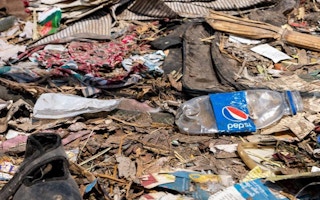Record-low Covid-era oil prices have made virgin plastic much cheaper than recycled plastic, forcing many recycling plants around the world to close. But some of the worst-ever market conditions for recyclers didn’t stop an investment company backed by multinational brands from pumping millions into Asian recycling businesses last week.
To continue reading, subscribe to Eco‑Business.
There's something for everyone. We offer a range of subscription plans.
- Access our stories and receive our Insights Weekly newsletter with the free EB Member plan.
- Unlock unlimited access to our content and archive with EB Circle.
- Publish your content with EB Premium.
Circulate Capital, a Singapore-based investment firm that launched with a US$100 million war chest to tackle marine pollution in South and Southeast Asia in 2018, has invested US$6 million in an Indonesian and Indian recycling firm to help them weather the pandemic-induced financial crisis, and to grow and scale their businesses once market conditions improve.
One of the recyclers, Mumbai-based Lucro, converts low-value flexible plastic such as shrink wrap into plastic granules that are sold to manufacturers in India. The other, Jakarta-headquartered Tridi Oasis, turns Polyethylene terephthalate (PET) bottles into plastic flakes which are used to make packaging and textiles in Indonesia.
The companies funding Circulate Capital, which include PepsiCo, Coca-Cola, Unilever, Danone, Chanel and Procter & Gamble, are increasingly using recycled plastic in their products following consumer, civic society and regulatory pressure to take responsiblity for the marine pollution their products contribute to.
“
The only way to save the recycling industry is for brand owners to pay for the cost of recycling.
Dr Steve Wong, chief executive officer, Fukutomi Recycling, chairman, China Scrap Plastics Association
Circulate Capital chief executive Rob Kaplan said that when Covid-19 developed into a global crisis, the company questioned the timing of the investments—which are the first it has made.
“We said [to the funders] that our purpose is to improve the resilience and investability of the recycling sector, do you agree with us? It’s your money, not ours. Their answer was resoundingly yes, we have to keep going, because we are going to need these companies to be successful to meet our demand [for recycled plastic].”
The investments will help to build circular plastic value chains that prevent plastic pollution at a time when single-use plastic use is surging as packaged goods deliveries to locked-down households rises and bring-your-own reuseable container schemes are scrapped.
“The already strained waste management and recycling sectors have been less functional [as a result of coronavirus containment measures]. We’re going to have a big fight against plastic pollution coming out of Covid-19,” he said.
Coronavirus has crippled waste collection, sorting and recycling services in many countries because of social distancing, staff absences and concerns about worker health and safety. This has prompted the United Nations Environment Program to call on governments to treat waste management as an essential public service.
“What brought us to this conversation [about tackling plastic pollution] was outrage over the topic. That outrage is only going to get louder. Our corporate partners think that too,” Kaplan said.
The only way to save the circular economy?
Dr Steve Wong, chief executive of Fukutomi Recycling and chairman of China Scrap Plastics Association, told Eco-Business that the only way to save the struggling recycling industry is for brand owners such as Coca-Cola, PepsiCo and Danone—which are routinely shamed as the world’s biggest plastic polluters by green groups—to pay for the high cost of recycling.
This, Wong said, will also come through regulation to push companies to use more recycled content through Extended Producer Responsbility (EPR) schemes, which force companies to take more responsiblity for the materials they produce by helping to collect, process and recycle it.
EPR laws that promote recycled content are already in place in numerous countries such as Japan and Korea for PET, which is used to make drink bottles, and high-density polyethylene (HDPE), which is used for shopping bags, and are likely to expand for other types of plastic in the future, Wong predicted.








